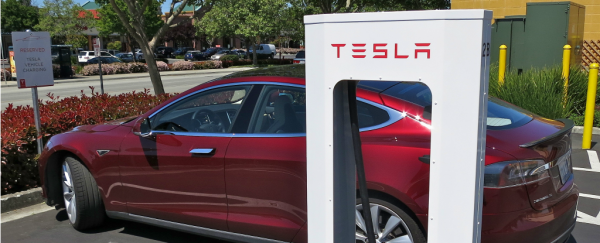A group of researchers and industry bodies have called on the Australian government to help support and incentivise electric vehicles - a move that they say could lower car emissions by up to 47 percent.
The group, which includes US tech giant Tesla and Swinburne University of Technology, wants the government to provide tax incentives, such as rebates on car registration and even reducing the cost of parking for electric cars in major city centres.
"We need to make it more financially appealing for consumers to consider purchasing electric vehicles," Swinburne pro vice-chancellor, Ajay Kapoor, says. "This could include incentives such as exempting them from fringe benefits tax, providing rebates on their car registration and reduced parking costs in the CBD."
While Australians have shown interest in switching from coal to solar when it comes to electricity, with 15 percent of Australian houses already topped with solar panels, we've not displayed the same enthusiasm for electric cars.
As Hayley Williams says over at Gizmodo, "In recent years, market share of [Electric Vehicles] EVs has reached as high as 0.75 percent in the US, 0.58 percent in Japan, and up to 1.1 percent in the UK - while they make up only a paltry 0.01 percent of the Australian market."
But this isn't because Australians are set in their petrol-guzzling ways. Many of the countries where electric cars are doing well have been incentivised by their governments, while in Australia, most electric vehicles are actually hindered by something called the Luxury Car Tax, which adds a tax rate of 33 percent if your electric car is worth more than AUD$75,000.
But something needs to change, and fast, with the transport industry producing 17 percent of Australia's car emissions. And that number is expected to rise to 23 percent by 2020.
The campaign group, co-ordinated by non-profit organisation ClimateWorks, says that widespread adoption of electric cars in Australia could cut these emissions between 19 and 47 percent, and will be even better for the environment if solar power or other types of renewables are used to recharge.
"Electric vehicles are the solar panels of the automotive industry. With the right support, we could see a rapid uptake that would have positive outcomes for our health, the economy and for consumers," ClimateWorks CEO Anna Skarbek said in a press release.
The joint submission calls for electric vehicles to be as cheap and convenient for consumers as possible, with solutions including government fleet incentives, stamp duty discounts, toll lane exceptions, and more EV charging stations Australia-wide.
"Most electric vehicle charging is done at work and at home. Therefore, we're encouraging federal and state governments to work with developers to ensure that all new multi-dwelling buildings, apartments and office buildings have electric vehicle charging planned and built from construction," Kapoor said. "Combined with targeted programs aimed at encouraging workplace and home charging, this could make electric vehicle use more convenient and affordable."
Hopefully Australia can pick up its game, considering how important this technology is for our future. Plus there are some badass electric cars about to be released… Just give us a little bit of (financial) encouragement, and we'll be all over it.
Swinburne University of Technology is a sponsor of ScienceAlert. Find out more about their innovative research.
